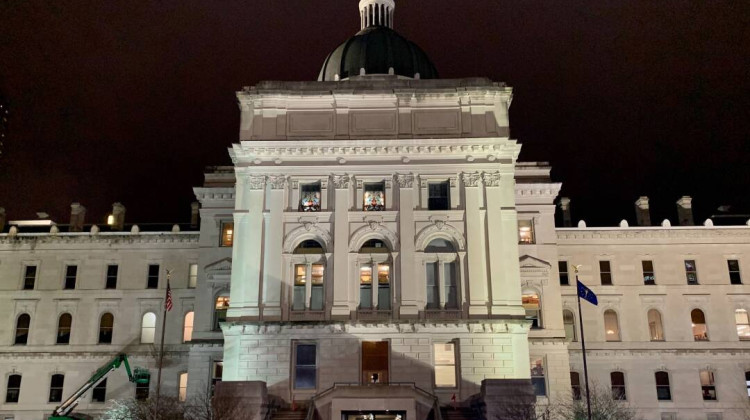
Indiana would be eligible for about $2 million from the CARES Act to help cover the costs of starting a work-share program. But that money will no longer be available to states after 2023 unless congress extends the deadline.
FILE PHOTO: Justin Hicks/IPB NewsThousands of Hoosiers lose jobs to lay-offs or closures annually. Hundreds of workers are already set to be affected by scheduled layoffs or closures this year, according to the state’s Worker Adjustment and Retraining Notification (WARN) notice page.
Some lawmakers want to give Indiana employers a new option to keep workers during difficult times.
A committee voted to advance Senate Bill 347 Wednesday. The bill would create a “work-sharing” program in Indiana.
Instead of layoffs, work-share lets companies reduce employees’ hours and have the state pay affected workers a portion of their unemployment benefits relative to hours lost.
Ashton Eller testified in support of the bill on behalf of the Indiana Chamber of Commerce.
“Among the benefits of the program, employers retain well trained employees,” Eller said. “And when the economy recovers, work hours are increased and the employer does not have to go outside of his or her walls to recruit new talent. They're already there.”
Similar bills failed in past years despite broad business and workers’ groups support. Only the Indiana Manufacturers Association opposed the idea in testimony last week.
“First and foremost, we're here today to question the need for work-sharing unemployment insurance program in today's economy, with the labor market being as tight as it is,” said Sam Charron, the association’s director of governmental affairs. “We are concerned that such a program may serve to incentivize part time employment with unemployment insurance benefits serving as a wage subsidy.”
Charron also expressed concern about the ability for the state agency in charge of unemployment, the Department of Workforce Development, to handle this additional program. DWD estimates it would cost about $2.5 million to get the program up and running, followed by another $1 million annually in staffing costs.
Indiana would be eligible for about $2 million from the CARES Act to help cover the costs of starting a work-share program. But that money will no longer be available to states after 2023 unless Congress extends the deadline.
“We believe that spending less than $1 million, after the CARES Act funding is deducted, to build work sharing is worth investing,” Eller said. “Now is the time to enact a work-sharing program, before the next recession hits while we are at full employment.”
Join the conversation and sign up for the Indiana Two-Way. Text "Indiana" to 73224. Your comments and questions in response to our weekly text help us find the answers you need on statewide issues throughout the legislative session. And follow along with our bill tracker.
Here’s a simplified example of how this program could work: a company decides it needs to cut costs because of a dip in demand for their products. The company can lay off a percentage of its workforce or cut workers’ hours by 30 percent.
If the company decides to go for the hour-reduction, they can sign up for the work-share program with the state. If approved, their workers would get 70 percent of their regular paycheck and 30 percent of the unemployment benefits they would have gotten if they lost their jobs entirely. The workers would likely also get to hold on to healthcare and any other benefits they received under full time employment.
Indiana’s maximum weekly unemployment payment is $390. Assuming the workers in this example qualify for that maximum payment, they would get something like $117 a week alongside 70 percent of their regular pay. SB 347 currently sets the minimum number of hours a worker reduced to in this program at 50 percent of their normal hours.
“Employees are not made whole financially, but they're a lot better off than they would be if they were laid off entirely,” Eller said. “They avoid the trauma and financial challenges of becoming unemployed.”
Unlike other unemployment beneficiaries, work-share recipients would not be subject to work search requirements.
Layoffs often spike during economic downturns. In 2020 and 2008, more than 20,000 Hoosier workers were affected by layoffs or closures, according to the state’s WARN page. Most other years don’t even near 10,000 affected workers.
Sara Blevins, senior counsel for Cummins, told lawmakers during testimony last week that the Columbus-based manufacturing giant “successfully uses work-share programs in other states, like New York, which has resulted in increased stability both for the business and for our employees.”
“If Senate Bill 347 becomes law, Cummins anticipates utilizing the program to benefit our business and our Hoosier employees,” Blevins said. “Adopt work-share in Indiana to help employers retain their highly skilled workforces and navigate the ups and downs of our economy.”
Sen. Andy Zay (R-Huntington) echoed concerns about DWD’s ability to handle the new program as it recovers from the “heap” of work brought on by the pandemic. He also notes the state’s unemployment fund is already considered underfilled by federal standards.
“I think it's the creating of a new program that kind of bothers me with this. I'm not sure it's necessary. I'm not sure the fund is at the level it needs to be at,” Zay said.
Supporters point to evidence suggesting similar programs in other states aren’t draining unemployment funds. Michigan had some of the highest work-share participation in the nation in 2020 and saved “millions” from the state’s unemployment fund.
Zay was the only present member of the Senate Pensions and Labor Committee to vote against advancing the bill Wednesday. Because it would require funding, SB 347 must now pass the Senate Appropriations Committee before it can be considered by the full Senate.
Adam is our labor and employment reporter. Contact him at arayes@wvpe.org or follow him on Twitter at @arayesIPB.
9(MDAyMzk1MzA4MDE2MjY3OTY1MjM5ZDJjYQ000))
 DONATE
DONATE








 Support WFYI. We can't do it without you.
Support WFYI. We can't do it without you.